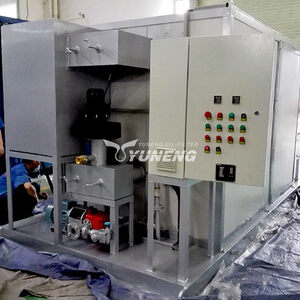How Transformer Oil Regeneration Machines Save Money and the Environment
Body
Environmental Champion
Reduced Waste: Regeneration machines significantly reduce the amount of used oil requiring disposal, minimizing the environmental impact associated with transportation, treatment, and potential leaks. This aligns with growing pressure for sustainable practices in the energy sector.
Extended Oil Life: By removing impurities and restoring key properties, regeneration machines can extend the lifespan of existing oil by several years. This translates to fewer oil changes, reducing the environmental footprint associated with the production and disposal of new oil.
Lower Emissions: Less frequent oil replacement means fewer associated transportation emissions, contributing to a cleaner carbon footprint for transformer operations.
Financial Friend
Cost Savings: Regeneration is often significantly cheaper than complete oil replacement. The cost savings can be substantial, especially for transformers requiring large oil volumes or frequent maintenance.
Reduced Downtime: Regeneration can be performed on-site, minimizing transformer downtime compared to traditional off-site oil processing. This translates to reduced lost revenue and improved grid reliability.
Extended Transformer Life: As mentioned earlier, extending oil life through regeneration effectively extends the lifespan of the transformer itself, delaying costly replacements and optimizing asset utilization.
Beyond the Numbers
Peace of Mind: Knowing that transformers are operating with clean, healthy oil provides increased confidence in their performance and reliability, reducing the risk of unexpected failures and associated costs.
Regulatory Compliance: Stringent environmental regulations regarding oil disposal are becoming increasingly common. Regeneration machines offer a compliant and sustainable solution for transformer maintenance.
Future-Proofing: Investing in regeneration technology aligns with the global shift towards sustainable practices in the energy sector, positioning businesses for long-term success.
Not a Magic Bullet
While regeneration offers significant benefits, it's crucial to consider its limitations:
Initial Investment: Regeneration machines require an upfront investment, although the long-term cost savings often outweigh the initial expense.
Not for All Oils: Heavily contaminated oils may not be suitable for regeneration, requiring alternative disposal methods.
Expertise Required: Operating and maintaining these machines effectively requires trained personnel.
Conclusion
Transformer oil regeneration machines offer a compelling solution for both the environment and your wallet. By reducing waste, extending oil life, and minimizing downtime, they contribute to a sustainable and cost-effective approach to transformer maintenance. While initial investment and operational considerations exist, the long-term benefits make regeneration a powerful tool for responsible grid management.














Comments